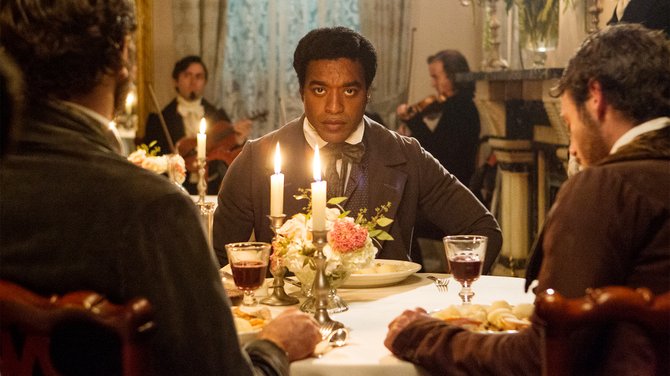In the film "12 Years a Slave," a white drunkard and degenerate gambler named Armsby is, for a time, forced to labor alongside black slaves in the cotton fields of Louisiana, presumably to work off a debt. At the end of his first day picking cotton in the fields owned by the cruel plantation owner Edwin Epps (Michael Fassbender), Armsby (Garret Dillahunt) picks just 65 pounds.
On Epps' plantation, any slave who picks less than he or she seems capable of is flogged. But Armsby's flaccid load earns him only a pep talk, while the film's protagonist, Solomon Northup (Chiwetal Ejiofor), and other slaves who missed their mark are led out of the barn for their daily beating.
On the same day, the diminutive Patsey (Lupita Nyong'o) picks her usual 500-pound bale, for which Epps hails his pet gift from God, a "ngger among nggers." For Patsey, who is also the object of Epps' sadistic sexual desires, winning her master's esteem is no consolation.
"I got no comfort in this life," she confides to Solomon one night.
There is no comfort at all in "12 Years a Slave," which Steve McQueen directed and Brad Pitt, who also has a small role, co-produced. Like many of the films about slavery that preceded it, "12 Years" is based on the true events of Solomon Northup's life.
A talented violinist from New York, Solomon traveled to Washington, D.C., in 1841 as part of a circus of sorts. There, in the nation's capital, Solomon is kidnapped and, reminiscent of the powerful scene in the 1970s miniseries "Roots," a new identity as a runaway slave from Georgia is literally beaten into him. Solomon is eventually sold into slavery in Louisiana, where he later writes, "slavery exists in its most abject and cruel form."
It's that abject cruelty of America's most awful institution that provides the thread for Solomon's story, and not only makes it hard to watch, but hard to find anything to be hopeful about. It seems possible Solomon could be killed at any moment; we steady ourselves for the next act of crushing inhumanity to which black bodies will be subjected.
In that way, "12 Years" is an obvious rebuke of its precedents.
For example, in "Glory," the fictionalized account about a band of slaves who escape to enlist in the Union Army during the Civil War, the audience knows—no matter what happens to the Massachusetts 54th Infantry—that the good guys will win the war.
The drama in "Amistad" (1997) and "Lincoln" (2012) mostly takes place in courtrooms between white heroes and villains; slavery is more or less a device.
"Django Unchained" does for slavery what "Inglourious Basterds" (Quentin Tarantino directed both films) does for the Holocaust in creating an alternative history where a formerly enslaved bounty hunter in Mississippi has license to kill evil white folks who cross his path.
But when Solomon Northup fights back and turns the whip on a weasely little overseer, it's only a fleeting triumph as we brace for the white world's vicious reprisal. Even as Solomon rides away to be reunited with his family in the North, part of us wishes it were Patsey who was on her way to freedom instead.
It's a hard, hard movie. But if Solomon Northup and millions of others survived slavery, there's really no reason you can't.



Comments
Use the comment form below to begin a discussion about this content.
comments powered by Disqus